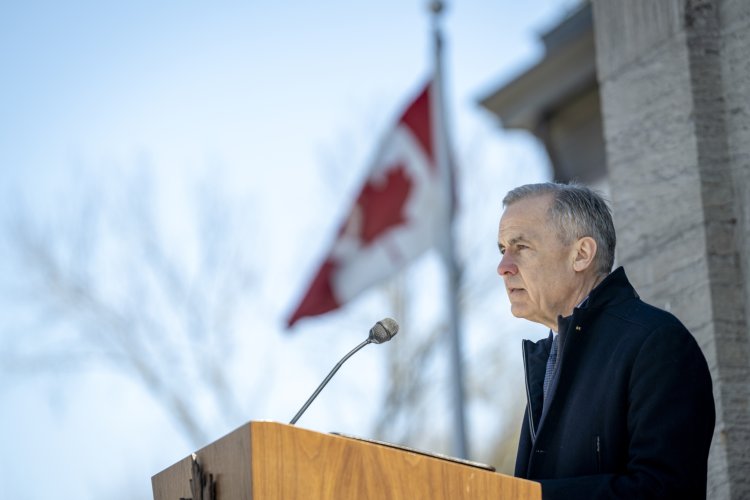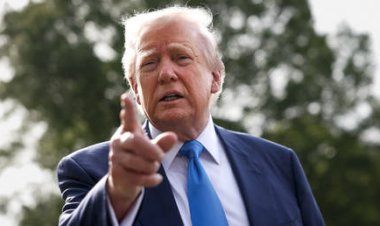Canada and Trump: Predictions for How Monday's Election Will Unfold
The U.S. president’s tariffs and insults have changed alliances across the board, creating effects that resonate from Quebec to Alberta to Washington.

“People said, ‘You’ve got to call him,’” Ford recalled this week. “He said, ‘What advice can I get?’ I said it’s one thing, our polling shows it, we just came off a big victory: It’s the tariffs. A number of years ago, [James] Carville said, ‘It’s the economy, stupid.’ Well, it’s the tariffs, stupid. That’s what it is.”
So why didn’t Poilievre adapt his message?
“I can’t figure it out,” Ford remarked, seeming to revel in his insight days before the federal election.
The dynamics surrounding Monday’s federal election are relatively straightforward: a campaign that initially served as a referendum on former Prime Minister Justin Trudeau's unpopular decade had shifted into a contest revolving around the ability to manage Donald Trump and his tariff threats.
However, the situation is more complex.
The Liberals are poised to retain power, and Prime Minister Mark Carney may even secure a majority in the 343-seat House of Commons. This is, in part, due to Poilievre’s failure to adjust to the evolving election landscape, which alienated crucial leaders and voters. The Liberal Party not only replaced Trudeau with a centrist leader but has also faced a situation where American-style, two-party politics are encroaching upon Canada's historically multi-party system.
This shift could significantly impact whether the Liberals achieve a majority or a minority government, reflecting a political environment that Canadian voters find hard to comprehend. Canada’s political landscape has long included influential minor parties such as the New Democratic Party and Bloc Québécois. Yet, the urgency of confronting Trump has diminished their relevance, causing voters to prioritize national unity over internal debates over platform purity.
The anticipated collapse of the NDP could lead to the highest proportion of votes for the two major parties in generations.
The irony is palpable: Canada is embracing American-style politics out of fear of American encroachment. Many Canadian voters share a sentiment similar to that of their American counterparts: not wanting to waste their ballots on less viable parties and inadvertently empowering the one they fear the most.
“The reason our third- and fourth parties weakened is because voters from those parties are rushing to the Liberals to stop Pierre,” said Liberal strategist Dan Moulton.
In conversations with Canadian officials and voters this week in the bustling Greater Toronto Area, a sense of unease looms as many begin to consider Canada’s future relationship with the U.S. and globally.
Canadians are feeling uneasy about tariff threats and Trump’s repeated suggestions of annexing the country; this has struck a raw nerve in a country that prides itself on its distinct identity.
The historical bond and similarities shared with the United States are now obscured by Trump’s perceived disdain for Canada’s sovereignty.
This situation has ignited a surge in nationalism visible in the many maple leaf flags that adorn vehicles and storefronts, accompanied by slogans like “Shop Local” and “Proudly Canadian Owned.” T-shirts declaring “Never 51” and “Not for Sale” have even surfaced, gaining traction in typically francophone Quebec.
Both leading candidates have adopted slogans reminiscent of Trump — with Poilievre’s “Canada First” and Carney’s “Canada Strong,” which suggests resilience in the face of adversity.
At a Poilievre rally, attendees sang “O Canada,” their voices rising at the word “free."
Yet, Canadians have come to realize that this situation isn't just transient.
“We’ll always be neighbors, and hopefully friendly neighbors, but the special relationship doesn’t exist,” remarked Tom Long, a veteran Conservative strategist. “We’ve got assets in the north that need to be defended from Russia and China and probably Americans now.”
When I asked a Liberal MP if Canada might consider a new security framework, perhaps with other Commonwealth nations, the response was immediate.
“One of the big projects is figuring out how does global security work when the U.S. is not the guarantor of the free world,” replied Chrystia Freeland, the former Finance Minister whose resignation contributed to Trudeau's downfall.
Freeland hinted that this new alliance “starts with France and the U.K.”
Beneath the surface in the final days of the election lies the tension from Canada’s conservative western provinces.
Although mainstream opinions suggest that Alberta and Saskatchewan are unlikely to pursue serious secession, there's palpable anxiety in the east regarding conservative discontent that may follow a fourth Liberal term. Discussions within Conservative circles have already begun considering how to manage potential secession movements in Alberta.
“If you had asked me what my biggest anxieties post-election are, regardless of the outcome, it is being sure people in Alberta and Saskatchewan feel that the Liberal party can speak for them and understand their concerns,” Freeland observed.
The concern is whether Trump will intensify his annexation rhetoric if he sees even a hint of secession sentiment from the resource-rich provinces.
“I think it will be,” Ford concurred when I posed the question of whether that would be a dangerous moment. “We’re also a little worried here in Ontario because we have more critical minerals than anywhere in the world. They have a ton of oil in Alberta. Why don’t we leverage that and all work together?”
Ford suggested a “Fortress Am-Can” approach, which he had previously carried to Washington, highlighting the shared security concerns facing both countries.
“China is cutting the U.S. off with their critical minerals that [Americans] need for their military, aerospace manufacturing,” he said. “And who has it? We have it here.”
I proposed to Ford that he could serve as Canada's representative in Washington, but he dismissed the idea as a step down, noting that Ontario's land mass surpasses that of Texas.
Long emphasized the importance of Carney immediately conveying national unity and suggested appointing Conservative Jean Charest as ambassador to the U.S. Charest, a former Quebec premier, had previously lost a leadership bid to Poilievre in 2022.
There are also potential moves Carney could make toward unifying perceptions with the western provinces, a gesture that could include canceling the oil and gas emissions cap that has angered many in Alberta.
Though Carney might not take that significant step, he has distanced himself from the divisive carbon tax policy.
The combination of Trudeau’s resignation and Carney's swift decision to eliminate Poilievre’s best issue wields considerable power.
At a Poilievre rally, I heard repeated sentiments that echo the hopes of change, reminiscent of last year’s American elections, where a new group of leaders briefly buoyed incumbents yet could ultimately lose when confronted with pressing quality-of-life issues.
“This is a change election,” declared Colin, an electrical worker sporting a Protect Hunter t-shirt.
However, the difference lies in Carney's immediate pivot away from the controversial carbon tax, a move dissimilar to how Kamala Harris would maintain a supportive stance toward Biden.
A recent PMG/Focaldata survey indicated that cost of living is the primary concern for 60 percent of Canadian voters.
Complicating matters for Conservatives, the second most pressing issue among voters is Trump, with three-quarters expressing disfavor toward the American president.
Poilievre faces the challenge of bridging the divide between his base, which prioritizes distinct issues, and a broader electorate increasingly critical of U.S. politics.
While some Conservative activists express admiration for Trump, Poilievre seemed to tread carefully at the rally, focusing on domestic issues while echoing a quintessentially American Republican tone, emphasizing a military of “warrior culture not woke culture.”
He made a passing reference to Trump to critique Carney, stating that both “want to tax Canadian industries” through tariffs and taxes, yet his commentary felt insufficient.
Brian Clow, a former senior figure in Trudeau's administration, noted that while some Conservatives admire Trump, Poilievre is limited in attacking him too aggressively for fear of alienating his own supporters.
Moreover, Poilievre’s own political dynamics reveal limitations; he presents more as a blend of ideologies without a cohesive narrative that resonates broadly.
Demonstrating a strategy to soften his image, Poilievre relied on his wife for his rally introduction and brought a young girl to showcase her handmade sign. However, his campaign visibility is shaped less by his direct engagement and more through a commercial from former Prime Minister Stephen Harper endorsing him.
Key Conservative figures such as Ford and Tim Houston, who may harbor ambitions for leadership, are notably absent from support for Poilievre, despite having history with him.
When I interviewed Ford, he was playfully teasing Houston about timing for promotional material he had released.
Ford expressed concern that Poilievre has not forged the necessary relationships within the political community, stating: “Not at all. Or local mayors. Or anyone. I don’t understand it.”
I found it surprising for someone so entrenched in politics.
“It’s his campaign manager in my opinion,” said Ford, referencing Poilievre's strategist Jenni Byrne, who had previously parted ways with him. “But he’s still the boss, right?”
Ford held optimistic views of Carney’s potential to effectively communicate with Trump.
Considering Carney's profile, it’s conceivable he could thaw relations with Trump, who often aligns with individuals like Carney from prestigious backgrounds.
“If Mark wins, I think we’ll have a half-decent relationship,” Ford suggested, noting the connections that exist within certain circles.
That’s contingent, of course, on whether Trump can be restrained from his more predatory instincts. Conversations around the impending election have shifted extensively toward U.S.-related inquiries.
What is evident, though, is that the election outcome will reverberate across borders.
As Evan Solomon, a CBC anchor turned Liberal candidate in Toronto, expressed, “Canada’s the first referendum on Trump among democratic allies.”
James del Carmen for TROIB News
Find more stories on Business, Economy and Finance in TROIB business












